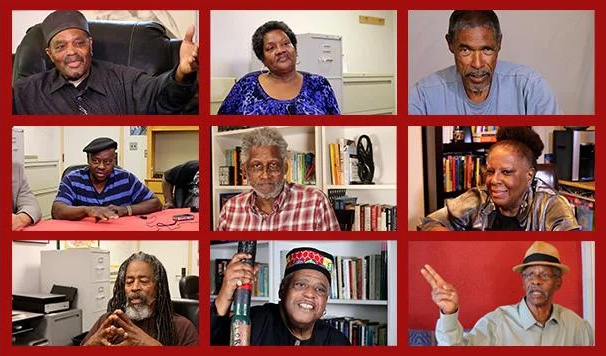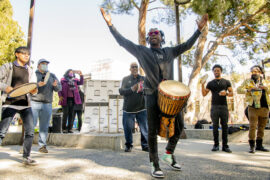
In the land of Hollywood, their stories seem to have been forgotten. Yet their dreams, disappointments, determination and anger help lay the foundation for what we now know as the Black Power Movement.
California State University, Northridge historian and archivist Keith Rice, working with Africana studies professor Karin Stanford, has spent the past decade collecting the oral histories of Los Angelenos who played key roles in the fight for recognition and social justice for America’s Black citizens. Some of those stories are now available on CSUN’s Tom & Ethel Bradley Center’s website and others can be accessed through the University Library’s archives.
“The interviews reveal that the Black Power Movement was a serious and often times deadly undertaking,” Rice said. “It was much more than public posturing in leather jackets, berets, and chants of ‘Off the Pig,’” he said. “It was a war over the right to exist as Black American citizens with all the rights and privileges that go with it. These interviews reveal the common philosophies, sometimes conflicting ideologies and the camaraderie that existed between some of the leading organizations within the Black freedom struggle in Southern California.
“Our interviews don’t just concentrate on a person’s time in the movement,” he continued. “They go back to their parents and their grandparents. We talk to people about who they knew, how they grew up, what their childhood was like. We wanted to find out what caused them to realize that this world was racist.”
Among those featured on the Bradley Center’s website are Deacon Alexander, a former member of the Black Panthers and a former Green Party California gubernatorial candidate; Kicheko Davis, a former member of the Black nationalist group US Organization and one of the creators of the African-American holiday Kwanzaa; and Watani Stiner, a member of the US Organization accused of killing Black Panther Party members Bunchy Carter and John Huggins and who is now an advocate for restorative justice.
“We discovered that most of them got into the movement because they were in the Emmett Till generation,” Rice said, pointing to the 1955 torture and murder in Mississippi of 14-year-old Till after he was accused on offending a white woman.
Their families moved to Los Angeles, like so many others who have migrated to the city, for a better life. The reality was much different, Rice said, adding that they didn’t expect the hardships they faced, including racism.
Rice said the oral histories are honest conversations about the subjects’ lives, their dreams and the realities.
“They are very candid, may be too candid,” he said. “They talk about what they did, what they went through and why they did it. They are more conversations than interviews. Conversations that help you realize how human they truly were.”
The stories are an important part of Los Angeles’ history, “a history we actually know very little about,” Rice said.
“LA is Hollywood, and everything is about the newest, the latest and the greatest,” he said. “It’s history, the fact that its citizens of color went on to start some of the largest political, social justice movements in this country’s history — including the Black Power Movement and the Chicano Movement — tends to be overlooked. It’s time LA learned its history, all of it.”



Comments are closed.